Are You Being Treated With Chemotherapy for Cancer?
If so, this booklet can help you. While chemotherapy helps treat cancer, it can also cause other things to happen in your body called side effects. Some of these problems affect the mouth and could cause you to delay or stop treatment.
This booklet will tell you ways to help prevent mouth problems so you’ll get the most from your cancer treatment.
To help prevent serious problems, see a dentist ideally 1 month before starting chemotherapy.
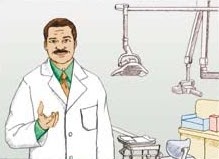
A dentist can help prevent mouth problems.
 Back to Top
Back to Top
How Does Chemotherapy Affect the Mouth?
Chemotherapy is the use of drugs to treat cancer. These drugs kill cancer cells, but they may also harm normal cells, including cells in the mouth. Side effects include problems with your teeth and gums; the soft, moist lining of your mouth; and the glands that make saliva (spit).
It’s important to know that side effects in the mouth can be serious.
- The side effects can hurt and make it hard to eat, talk, and swallow.
- You are more likely to get an infection, which can be dangerous when you are receiving cancer treatment.
- If the side effects are bad, you may not be able to keep up with your cancer treatment. Your doctor may need to cut back on your cancer treatment or may even stop it.
 Back to Top
Back to Top
What Mouth Problems Does Chemotherapy Cause?
You may have certain side effects in your mouth from chemotherapy. Another person may have different problems. The problems depend on the chemotherapy drugs and how your body reacts to them. You may have these problems only during treatment or for a short time after treatment ends.
- Painful mouth and gums.
- Dry mouth.
- Burning, peeling, or swelling tongue.
- Infection.
- Change in taste.
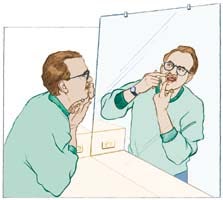
You can see or feel most of these problems. Check your mouth every day.
 Back to Top
Back to Top
Why Should I See a Dentist?
You may be surprised that your dentist is important in your cancer treatment. If you go to the dentist before chemotherapy begins, you can help prevent serious mouth problems. Side effects often happen because a person’s mouth is not healthy before chemotherapy starts. Not all mouth problems can be avoided but the fewer side effects you have, the more likely you will stay on your cancer treatment schedule.
It’s important for your dentist and cancer doctor to talk to each other about your cancer treatment. Be sure to give your dentist your cancer doctor’s phone number.
When should I see a dentist?
You need to see the dentist 1 month, if possible, before chemotherapy begins. If you have already started chemotherapy and didn’t go to a dentist, see one as soon as possible.
 Back to Top
Back to Top
What Will the Dentist and Dental Hygienist Do?
- Check and clean your teeth.
- Take x-rays.
- Take care of mouth problems.
- Show you how to take care of your mouth to prevent side effects.
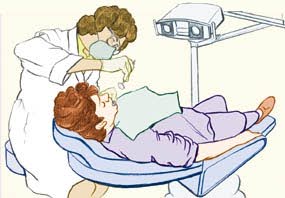
The dentist will do a complete exam.
 Back to Top
Back to Top
What Can I Do To Keep My Mouth Healthy?
You can do a lot to keep your mouth healthy during chemotherapy. The first step is to see a dentist before you start cancer treatment. Once your treatment starts, it’s important to look in your mouth every day for sores or other changes. These tips can help prevent and treat a sore mouth:
Keep your mouth moist.
- Drink a lot of water.
- Suck ice chips.
- Use sugarless gum or sugar-free hard candy.
- Use a saliva substitute to help moisten your mouth.
Clean your mouth, tongue, and gums.
- Brush your teeth, gums, and tongue with an extra-soft toothbrush after every meal and at bedtime. If brushing hurts, soften the bristles in warm water.
- Use a fluoride toothpaste.
- Don’t use mouthwashes with alcohol in them.
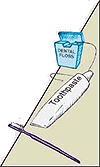
- Floss your teeth gently every day. If your gums bleed and hurt, avoid the areas that are bleeding or sore, but keep flossing your other teeth.
- Rinse your mouth several times a day with a solution of ¼ teaspoon each of baking soda and salt in one quart of warm water. Follow with a plain water rinse.
- Dentures that don’t fit well can cause problems. Talk to your cancer doctor or dentist about your dentures.
If your mouth is sore, watch what you eat and drink.
- Choose foods that are good for you and easy to chew and swallow.
- Take small bites of food, chew slowly, and sip liquids with your meals.
- Eat soft, moist foods such as cooked cereals, mashed potatoes, and scrambled eggs.
- If you have trouble swallowing, soften your food with gravy, sauces, broth, yogurt, or other liquids.
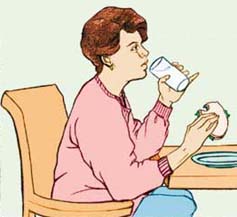
Sipping liquids with your meals will make eating easier.
Call your doctor or nurse when your mouth hurts.
- Work with them to find medicines to help control the pain.
- If the pain continues, talk to your cancer doctor about stronger medicines.
Remember to stay away from
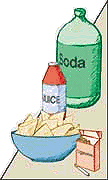
- Sharp, crunchy foods, like taco chips, that could scrape or cut your mouth.
- Foods that are hot, spicy, or high in acid, like citrus fruits and juices, which can irritate your mouth.
- Sugary foods, like candy or soda, that could cause cavities.
- Toothpicks, because they can cut your mouth.
- All tobacco products.
- Alcoholic drinks.
 Back to Top
Back to Top
Do Children Get Mouth Problems Too?
Chemotherapy causes other side effects in children, depending on the child’s age.
Problems with teeth are the most common. Permanent teeth may be slow to come in and may look different from normal teeth. Teeth may fall out. The dentist will check your child’s jaws for any growth problems.
Before chemotherapy begins, take your child to a dentist. The dentist will check your child’s mouth carefully and pull loose teeth or those that may become loose during treatment. Ask the dentist or hygienist what you can do to help your child with mouth care.

Your child has special dental needs.
 Back to Top
Back to Top
Remember:
- Visit your dentist before your cancer treatment starts.
- Take good care of your mouth during treatment.
- Talk regularly with your cancer doctor and dentist about any mouth problems you have.

Call your cancer doctor or dentist if you have any mouth problems.
 Back to Top
Back to Top
Acknowledgments
The individuals listed here provided assistance in developing and reviewing all of the publications in this series. The National Institute of Dental and Craniofacial Research and its partners would like to thank them for their contributions.
Scientific Committee
Gerry Barker, RDH, MA
University of Missouri-Kansas City
Kansas City, MO
Susan L. Beck, PhD, APRN, FAAN
University of Utah
Salt Lake City, UT
Marylin J. Dodd, PhD, RN, FAAN
University of California, San Francisco
San Francisco, CA
Joel Epstein, DMD, MSD, FRCD(C), FDSRCSE
University of Illinois at Chicago
Chicago, IL
Philip Fox, DDS
Spello, Italy
Deborah B. McGuire, PhD, RN, FAAN
University of Maryland
Baltimore, MD
Douglas E. Peterson, DMD, PhD
University of Connecticut
Farmington, CT
Mark M. Schubert, DDS, MSD
University of Washington
Seattle, WA
John R. Wingard, MD
University of Florida
Gainesville, FL
 Back to Top
Back to Top
This booklet is part of the series, Oral Health, Cancer Care, and You: Fitting the Pieces Together, focused on managing and preventing oral complications of cancer treatment. The series was developed by the National Institute of Dental and Craniofacial Research in partnership with the National Cancer Institute, the National Institute of Nursing Research, and the Centers for Disease Control and Prevention.
Other Publications in this series include:
For Patients
For Health Professionals
 Back to Top
Back to Top
This publication is not copyrighted. Make as many photocopies as you need.
NIH Publication No. 12-4361
August 2012
NIH…Turning Discovery Into Health